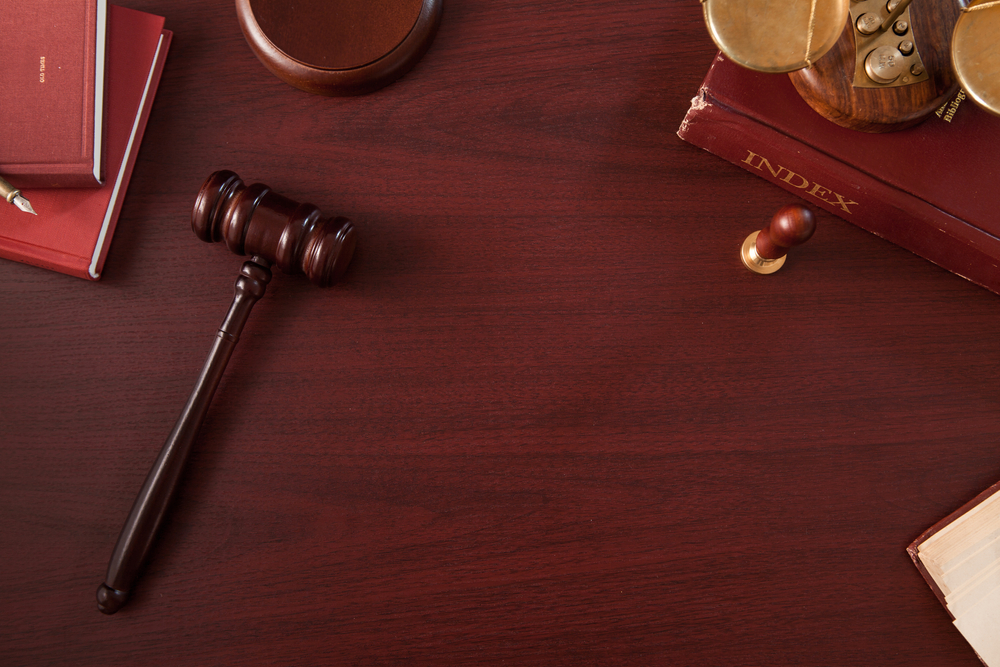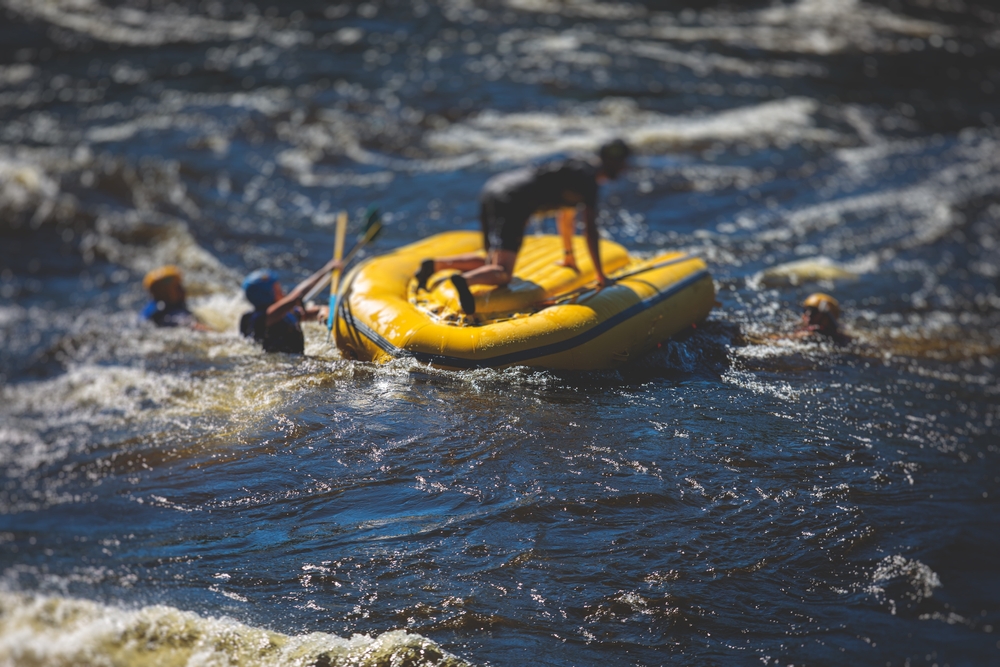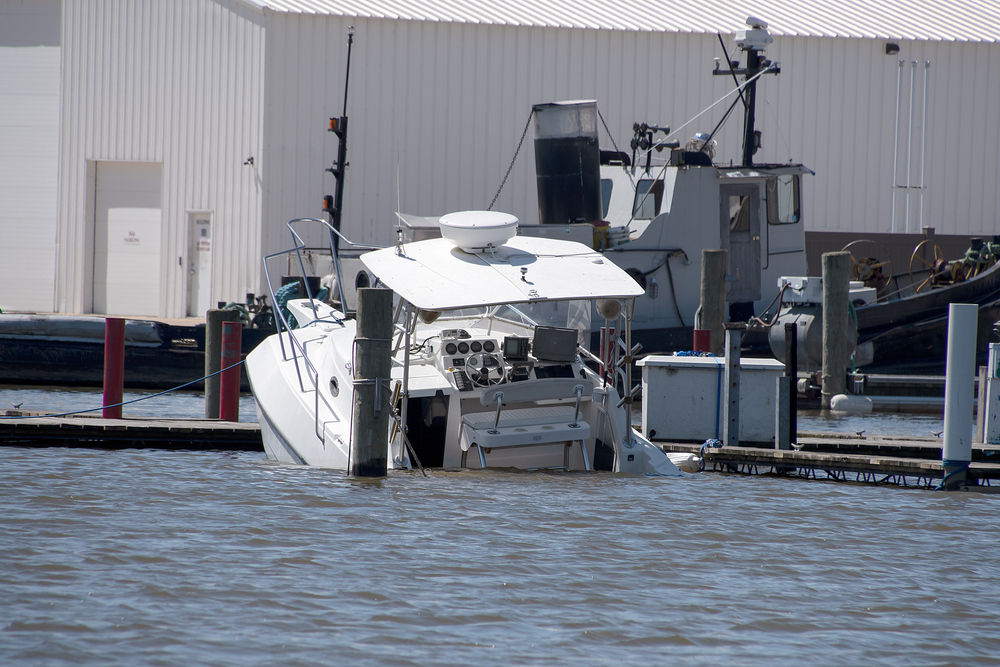Tampa Boating Accident Attorneys
Imagine you are enjoying a lovely day out on the water but it all suddenly ends when you collide with another boat or large object. You may be hurt, and your watercraft might be damaged and even sinking. This scenario could be made worse if your boat was not equipped with the proper safety equipment.
As a passenger, you often have little control over these types of accidents. As a boat owner or driver hit by another watercraft, you might be unclear about your legal recourse. Unfortunately, these types of accidents often leave boaters in pain, facing rising expenses, and under the overwhelming stress of not knowing what to do next.
Fortunately, there are legal systems in place that could help you pursue a lawsuit and seek financial compensation for your losses. With the Tampa boat accident lawyers at Hancock Injury Attorneys guiding you through your case, you will not have to worry about complex legal statutes. Let us take the worry off your shoulders. Our Tampa office serves clients throughout Central Florida, including Tampa, Spring Hill, and Wesley Chapel. Call us at 813-915-1110 to schedule a free consultation.
Why Work with a Tampa Boat Accident Lawyer from Our Legal Team?

Hancock Injury Attorneys focus on personal injury cases, including boating accidents. Our experience can be invaluable in navigating the complexities of your case. Being based in Tampa, we have a deep understanding of the local laws and regulations that may be relevant to your boating accident claim, including maritime law. We know the area, and we have represented people with similar claims. However, we recognize that each case is unique. Our legal team can provide personalized attention, ensuring that your specific needs and concerns are addressed.
Hancock Injury Attorneys has the resources to investigate the accident thoroughly, gather evidence, and build a strong case on your behalf. Choosing a law firm that shows compassion and understanding can make a difficult situation more manageable. Contact us today to discuss your case and discover how we can help you on your path to justice.
Our Office Locations
Our primary offices are located in Tampa at 1317 W Fletcher Ave., Tampa, Florida 33612. You can reach us by phone at the Tampa office at 813-915-1110. We have additional offices in Wesley Chapel at 2224 Ashley Oaks Circle, Suite 102-E, Wesley Chapel, Florida 33544. Call the Wesley Chapel office at 813-537-6927. We serve clients in Tampa, Spring Hill, Wesley Chapel, and throughout central Florida.
How Do Boating Accidents Typically Occur?
Statistics maintained by the Florida Fish and Wildlife Commission reflect that the overwhelming cause of accidents involving personal watercraft is due to collisions with other vessels. However, a watercraft accident could happen due to a variety of factors. Some common causes of boat wrecks include:
- Operator Error: Inexperienced or negligent boat operators can make mistakes, such as speeding, not paying attention, or operating under the influence of alcohol or drugs.
- Collisions: Collisions with other boats, objects, or fixed structures like docks are common causes of accidents.
- Equipment Failure: Mechanical failures or equipment malfunctions can lead to accidents, like engine problems or steering failures.
- Inadequate Safety Equipment: Not having or properly using safety equipment, such as life jackets or navigation lights, can lead to accidents.
- Overloading: Overloading a boat with too many passengers or excessive cargo can affect its stability and safety.
- Reckless Behavior: Dangerous activities like wake jumping or reckless maneuvering can lead to accidents.
- Inexperienced Operators: Novice boaters who lack proper training and knowledge may struggle to navigate safely.
Regardless of how in control the boat operator seems at the time of the incident, they could be held liable for your damages. An experienced boating collision attorney could analyze the facts of your case to determine the potential amount of fault assigned to the responsible parties.
Tampa Boating Accident Injuries

Boating accidents can lead to a wide range of injuries, and unfortunately, fatalities can occur as well. Some common boating accident injuries include:
- Drowning: This is a significant risk in boating accidents, especially if life jackets aren't worn or if the victim is trapped underwater.
- Traumatic Brain Injuries (TBIs): Head injuries can result from collisions or falls on a boat, causing TBIs with varying degrees of severity.
- Fractures and Dislocations: Broken bones and joint dislocations can occur when individuals are thrown from a boat or collide with objects.
- Cuts and Lacerations: Sharp objects on a boat or broken glass can cause cuts and lacerations.
- Burns: Fires or explosions on a boat can lead to burn injuries.
- Hypothermia or Hyperthermia: Exposure to extreme cold or heat can cause these life-threatening conditions.
- Spinal Cord Injuries: Severe accidents may result in spinal cord injuries, leading to paralysis or other long-term disabilities.
- Soft Tissue Injuries: Sprains, strains, and contusions are common in boating accidents.
- Death: Tragically, fatal boating accidents can occur, often because of drowning, severe injuries, or other circumstances.
To prevent these injuries, it's crucial to follow boating safety guidelines, wear life jackets, and operate boats responsibly. In the event of a boating accident, seeking immediate medical attention is vital, and consulting with an attorney experienced in maritime law is advisable to understand your legal options.
Filing a Personal Injury Claim for a Boating Accident
If you have been involved in a boating accident in Tampa and suffered a personal injury, or if someone you love was killed, you may be able to file a claim to seek compensation for your damages. Filing a personal injury claim can help you recover damages such as medical bills, lost wages, and pain and suffering. A wrongful death claim can compensate the surviving family for things like funeral and burial expenses, as well as financial compensation for lost earnings and emotional loss.
Filing a personal injury claim for a boating accident with injuries or wrongful death in Florida involves several crucial steps. Here's an outline of the typical process:
- Seek Medical Attention: If there are injuries, your first priority is to seek immediate medical attention for yourself or anyone injured in the boating accident. Medical records will be important evidence in your case.
- Report the Accident: Report the boating accident to the appropriate authorities. In Florida, you typically need to report an accident if it resulted in death, injury, or significant property damage. Local law enforcement or the Florida Fish and Wildlife Conservation Commission (FWC) may handle the investigation.
- Preserve Evidence: Document the accident scene, gather witness information, and take photos if possible. Preserve any evidence related to the accident, such as damaged equipment, boat registration, and any communication related to the accident.
- Consult an Attorney: Contact a personal injury attorney with experience in boating accidents. They can provide legal advice, evaluate the merits of your case, and guide you through the legal process.
- Determine Liability: Your attorney will help determine who is at fault for the accident. This might involve investigating the actions of the boat operator, the boat manufacturer, or other parties.
Establishing Liability
In a boating accident claim, liability can be attributed to various parties depending on the specific circumstances of the accident. Establishing liability involves investigating the incident thoroughly and determining who was responsible for the accident. Here are potential parties that may be liable and how an attorney can establish liability:
- Boat Operator: The boat operator is often the first party considered for liability. An attorney may establish operator liability by demonstrating negligence, such as operating the boat while intoxicated, failing to obey boating regulations, or not exercising proper care and caution.
- Boat Owner: If the boat owner is different from the operator, they may be held liable if they entrusted the boat to an unfit or inexperienced operator, or if they failed to maintain the boat properly, leading to the accident.
- Manufacturers and Distributors: If a defect in the boat or its components contributed to the accident, the manufacturer or distributor of the defective part may be liable. An attorney can establish liability by showing that a design or manufacturing defect caused the accident.
- Rental Companies: If the boat was rented, the rental company may be liable if they rented the vessel to an unqualified operator or if they failed to provide proper safety instructions or equipment.
- Other Boaters: If another boater's actions, such as reckless navigation or boating under the influence, directly led to the accident, they may be held liable.
- Government Entities: In some cases, government entities may be liable for boat accidents in navigable waters if they failed to maintain navigational aids, failed to enforce regulations or other acts of negligence contributed to the accident.
To establish liability, an attorney typically follows these steps:
- Investigation: The attorney conducts a comprehensive investigation into the accident. This includes collecting evidence, speaking with witnesses, and reviewing any available documentation, such as accident reports or maintenance records.
- Expert Witnesses: Attorneys may consult with expert witnesses, such as marine safety experts or accident reconstruction specialists, to provide professional opinions on the cause of the accident and who may be liable.
- Legal Research: The attorney will research relevant laws and regulations, including maritime and boating laws, to determine whether any violations or negligence occurred.
- Negligence Proof: To establish liability, the attorney must demonstrate that the party in question acted negligently, breached a duty of care, and that this negligence directly caused the accident and resulting injuries or damages.
- Documentation: The attorney will compile all relevant evidence, such as medical records, accident reports, photos, and witness statements, to build a strong case.
- Legal Action: If necessary, the attorney will file a lawsuit on behalf of the injured party, outlining the basis for the claim and the reasons why the defendant(s) should be held liable.
- Negotiation or Litigation: Depending on the circumstances, the case may be resolved through negotiation with the responsible parties or their insurers, or it may proceed to litigation in court.
Establishing liability in a boating accident claim can be complex, but with a thorough investigation and a skilled attorney, you can hold the responsible party accountable and seek compensation for injuries and damages. It's important to consult with a legal professional experienced in personal injury and maritime law to navigate the process effectively.
Could I Sue a Local Jet Ski Rental Company If I Signed A Release Or Waiver?
Jet skis are a popular form of recreation, but the activity is inherently dangerous in many ways. Many companies that rent these watercraft make you sign a waiver or release form before riding. These signed documents tend to hold up in court, absolving the rental company of liability for accidents.
Can I File a Lawsuit On Behalf Of My Child?
The state legislature enacted a substantial amendment to § 744.301of the Florida Statutes in April 2010. This legislation reverses the Kirton decision, which had previously held that parents and guardians could not execute enforceable pre-injury releases on behalf of minors in commercial activities.
The amended law now allows parents and natural guardians to execute pre-injury releases for their minor children, but only for those dangers inherent in the activity and only if a specific form is included. The statute does not shield commercial watercraft owners and boat operators from injury caused by their negligence. If you need help handling an injury case involving your minor child, you should seek out a qualified Tampa boating accident lawyer.
What Damages May be Available for a Boat Accident Claim?

Damages available in a boat accident claim can vary depending on the specifics of the case, including the severity of injuries and whether it involves a wrongful death. Here are the types of damages that may be available in a boat accident claim:
- Medical Expenses: This category covers all medical costs related to the injuries sustained in the accident. It includes hospital bills, surgeries, medication, rehabilitation, and any future medical expenses for ongoing treatment.
- Lost Income: If the injured party is unable to work due to the accident, they may be entitled to compensation for lost wages. This includes both current lost income and potential future earnings if the injuries result in a long-term disability.
- Pain and Suffering: These non-economic damages compensate for the physical and emotional suffering caused by the accident, such as pain, mental anguish, and emotional distress.
- Property Damage: If personal property, such as the boat or any equipment on board, is damaged in the accident, compensation can be sought to cover the repair or replacement costs.
Wrongful Death Damages
In cases of wrongful death resulting from a boat accident, the following damages may be available:
- Funeral and Burial Expenses: These costs associated with laying the deceased to rest are typically covered.
- Loss of Financial Support: If the deceased was a primary breadwinner, surviving family members may be entitled to compensation for the loss of financial support.
- Loss of Companionship: Compensation for the emotional loss and companionship experienced by surviving family members.
- Loss of Inheritance: If the deceased had a substantial estate, heirs may seek compensation for the loss of the inheritance they would have received.
- Punitive Damages: In cases of extreme negligence or intentional misconduct, punitive damages may be awarded to punish the responsible party and deter similar behavior in the future.
It's important to note that the availability and amount of damages can vary based on the specific circumstances of the boat accident and the laws in the relevant jurisdiction.
How Can a Boating Accident Attorney Help Me?
You may be dealing with recovering from your injuries, worrying about hospital bills, and thinking about others in the accident. Thinking about filing an insurance claim or seeking compensation by hiring an attorney is hard to imagine dealing with, too. But, by hiring an attorney you do not have to go through this process alone. Our experience equips us to take care of:
- Investigating the Accident and Gathering Evidence: We will make sure to get a report if available, talk to any witnesses, and use experts to independently investigate the accident to figure out what exactly happened.
- Filing an Insurance Claim: Part of what an attorney will do is help you file an insurance claim. We will make the calls, fill out the forms, and deal with the insurance company for you.
- Any and All Negotiations with the Insurance Companies: After filing, the insurance company might make an offer to settle the case. We will make sure that the offer is fair and negotiate with them to cover all your losses.
- Filing a lawsuit if necessary, and subsequently settling your case through mediation or trial: If the insurance company does not agree to a fair settlement, we will file a lawsuit to move the case into litigation. This may involve taking depositions, mediations, and more. If a settlement cannot be reached, we are prepared to take the case to trial to get a judgment from a judge or a jury verdict.
It is important to note that there may be situations where you are not permitted to file a lawsuit. An experienced boat accident attorney can help guide you through the process and identify whether you have a viable claim.
Maritime Law and Boat Accident Injury Claims
Maritime law, also known as admiralty law, can play a significant role in boating accident claims, especially when accidents occur in navigable waters. Some key considerations include:
- Jurisdiction: Maritime law can establish jurisdiction for cases that occur in federal waters or international waters, which may affect where a lawsuit is filed.
- Liability: It governs liability rules and regulations, addressing issues like negligence, negligence per se, and unseaworthiness.
- Compensation: Maritime law can influence the types of compensation available to victims, which may include maintenance, unearned wages, and more.
- Federal Admiralty Rules: Federal rules and regulations often apply in maritime cases, and they can differ from state laws.
It's important to consult with a maritime attorney who has experience in this area to navigate the specific legal aspects of your boating accident case. They can provide guidance tailored to your situation.
What Should I Do After A Boat Crash?
Under § 327.30 of the 2019 Florida Statutes, the following steps should be taken by the operator of a boat following a collision or accident:
- Remain at the scene of the accident.
- Provide assistance, as practicable, to others involved to save them from harm or minimize the danger caused by the collision.
- If the other vessel involved is unattended, the operator must take reasonable steps to locate and notify the boat’s owner of the incident and provide them with their contact information and registration.
- Inform any relevant authorities of the collision or accident without delay and by the quickest means available.
By assisting others involved in a boating collision or accident and promptly notifying the appropriate authorities, the operator of a vessel could reduce the harm suffered by the passenger.
Boat Owner Safety Guidelines and Responsibilities in Tampa
Unfortunately, Tampa has the highest rate of boating accidents anywhere in the country. You can avoid preventable collisions by making yourself aware of Florida’s Vessel Safety Laws.
Specifically, Florida Statute Chapter 327 sets out that anyone who operates a boat with willful disregard for the safety of persons or property can be subject to both criminal charges and civil liability for the injuries they negligently cause. If you are part of the boating community, here are several important rules and regulations you should keep in mind:
- “Personal watercrafts” are defined as marine vessels less than 16 feet in length using an inboard motor, including jet skis.
- Each person operating, riding on, or being towed behind a personal watercraft must wear a U.S. Coast Guard-approved non-inflatable personal flotation device (PFD), also known as a life preserver.
- When a vessel less than 26 feet in length is in motion, all children younger than 6 must wear a U.S. Coast Guard-approved PFD.
- Both federal and state law require the use of navigation lights from sunset to sunrise.
- Personal watercraft may not be used, nor can a vessel pull a skier or riders on a tube, from half an hour after sunset to half an hour before sunrise, even if navigation lights are on.
- A person must be at least 14 years of age to operate a personal watercraft in Tampa. It is a second-degree misdemeanor to knowingly allow a child younger than 14 to operate a personal watercraft.
- Maneuvering a personal watercraft by weaving through congested water traffic, jumping the wake of another vessel at an unreasonably close distance, or if visibility around the vessel is obstructed, or an operator swerving at the last moment to avoid a collision may be classified as reckless operation of a boat. This is a first-degree misdemeanor.
If the boat operator or owner fails to follow these laws, you might have a valid negligence claim, so get in touch with a seasoned Tampa boat accident lawyer right away.
Schedule Your Free Consultation with One of Our Tampa Boating Accident Lawyers Today

Boating accidents can be devastating, but you don't have to face the aftermath alone. Let Hancock Injury Attorneys be your advocate, and together, we'll work toward a brighter future. We're here to help you seek justice and the compensation you deserve. Our experienced team is ready to fight for your rights and provide you with the support you need during this challenging time. We focus on personal injury cases, including boating accidents. With our deep knowledge of Florida's maritime laws and our track record of success, you can trust us to handle your case effectively. We also understand the emotional toll that a boat accident can take. Our compassionate team will be with you every step of the way, offering guidance, support, and reassurance. Your well-being is our top priority and we won't settle for less than the compensation you deserve. Contact us by calling 813-915-1110 or filling out the contact form on this website.